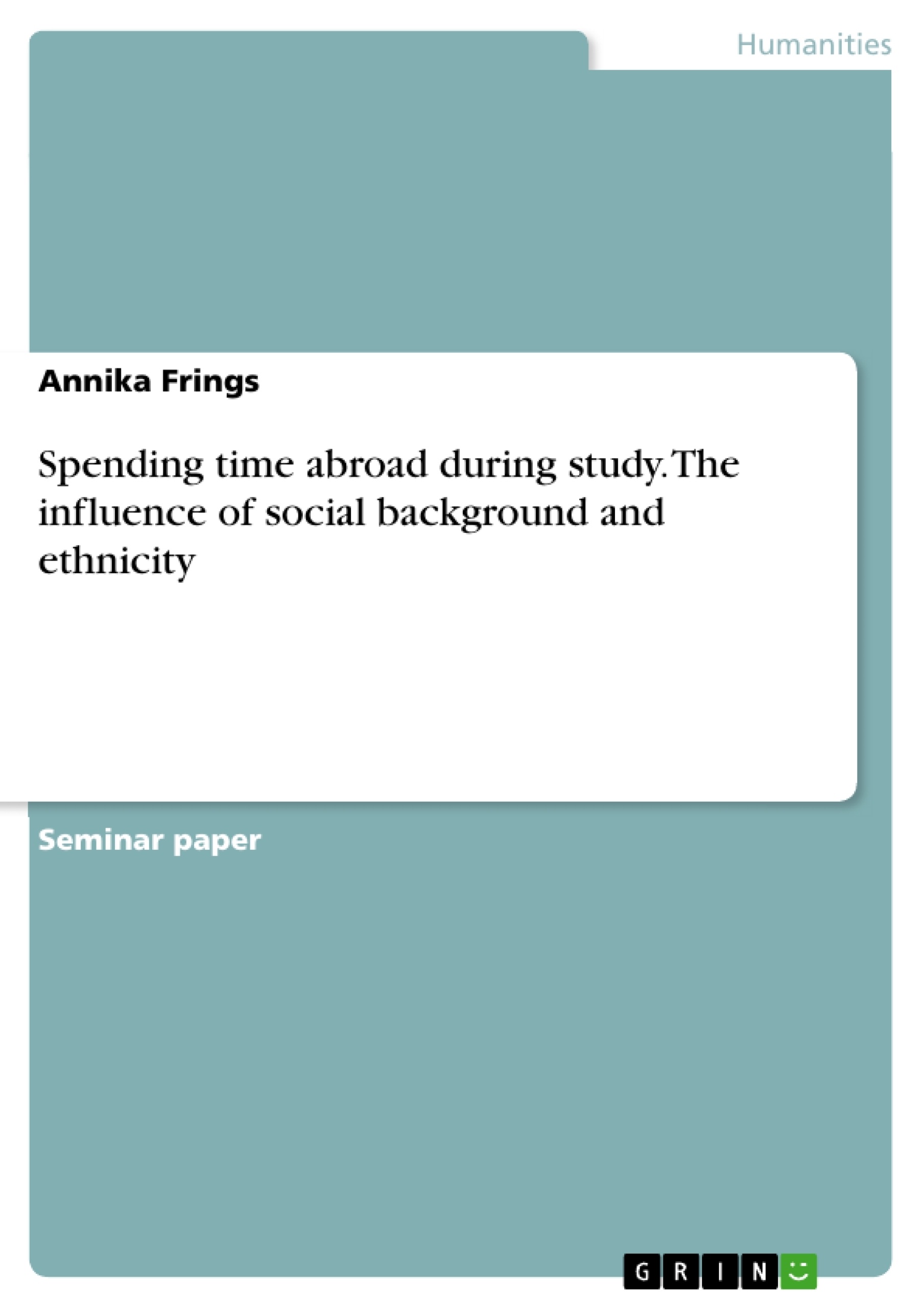This paper deals with the topic of students' abroad experience during study and aims at analysing how the study abroad decision gets influenced by social background and ethnicity. The hypothesis is that students whose parents have a degree of higher education themselves do more often spend time abroad during study than those with parents that do not own a degree of higher education. This is due to the fact that parents with a degree of tertiary education are more likely to have higher earnings and can financially support their children.
Universities encourage their students to participate in exchange programs and offer the impression that an exchange semester is an urgent part of study to get the most favorable jobs. The number of students that have spent time abroad during study has increased within the past years. In the year 2008 103.000 German students have studied at an university in a foreign country, this is an increase of 13 % compared to the data from 2007. The increase is even higher when looking at the development between 2001 and 2008, during this period of time the data even show an increase of 93 %. But there's still evidence that a gap remains between students with different social backgrounds in the likeliness to take part in exchange programs.
Inhaltsverzeichnis (Table of Contents)
- Introduction
- Theoretical and Empirical background
- Hypotheses
- Data, Variables and Method
- Results
- The influence of social background and ethnicity
- Applying control variables
- Conclusion
- Appendix
- References
Zielsetzung und Themenschwerpunkte (Objectives and Key Themes)
This paper investigates the influence of social background and ethnicity on the probability of students spending time abroad during their studies. The research aims to explore the factors that contribute to the decision to participate in exchange programs and analyze whether there are disparities in opportunity based on social background and ethnicity.
- Social inequality in study abroad participation
- Influence of parental education and income on exchange program participation
- Impact of ethnicity and cultural background on study abroad decisions
- Role of financial resources and support systems in facilitating study abroad experiences
- Analysis of gender differences in study abroad intentions
Zusammenfassung der Kapitel (Chapter Summaries)
The first chapter introduces the research topic, highlighting the increasing trend of student mobility abroad while acknowledging the persistent gap in participation based on social background. It outlines the motivation behind the study, focusing on the importance of understanding social inequality and its impact on educational opportunities.
The second chapter delves into the theoretical and empirical background of the research, examining existing literature that supports the hypothesis of personal factors influencing study abroad participation. It explores studies that connect family income, parental education, ethnicity, and previous travel experiences with the likelihood of students engaging in exchange programs.
The third chapter presents the hypotheses formulated for the study, suggesting that students from higher socioeconomic backgrounds with parents who have higher education degrees are more likely to spend time abroad during their studies. It also proposes that students with parents who were born abroad are more likely to participate in exchange programs.
Schlüsselwörter (Keywords)
This paper focuses on key topics such as social background, ethnicity, study abroad, exchange programs, student mobility, social inequality, parental education, income, cultural background, and gender differences in study abroad participation. The research aims to investigate the relationship between these factors and the probability of students spending time abroad during their studies.
Frequently Asked Questions about Studying Abroad and Social Background
How does social background influence the decision to study abroad?
Students whose parents have a higher education degree are more likely to study abroad, often due to better financial support and a family culture that values international experience.
What is the role of parental income in student mobility?
Higher parental earnings allow students to cover the additional costs of exchange programs, which remains a significant barrier for students from lower-income families.
Does ethnicity impact the probability of spending time abroad during study?
Research explores whether students with an international or migration background have a higher or lower inclination to participate in exchange programs compared to native students.
Why has the number of German students studying abroad increased?
Universities heavily promote exchange programs as a way to improve career prospects, leading to a 93% increase in students studying abroad between 2001 and 2008.
Is there still a gap in participation despite exchange programs?
Yes, evidence shows that a persistent gap remains between students of different social backgrounds in their likelihood to take part in international mobility.
Are exchange semesters considered essential for the job market?
Many universities and employers give the impression that international experience is a crucial part of a resume to secure favorable jobs in a globalized economy.
- Quote paper
- Annika Frings (Author), 2013, Spending time abroad during study. The influence of social background and ethnicity, Munich, GRIN Verlag, https://www.grin.com/document/504015



